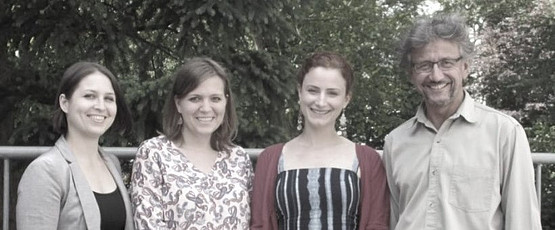FWF-Project "Dictionnaire historique de l’adjectif-adverbe" (2013-2016)
Historical Dictionary of French adjectives-adverbs
- Funding: FWF (P 25467 individual project)
- Project duration: 01.10.2013 until 20.09.2016
Team
- Project manager: Martin Hummel
- Technical management: Anna Gazdik
- Members of Staff: Helena Telsnig, Greta Korper
- Cooperation Partner: Raymund Wilhelm (AAU Klagenfurt)
The project's aim was the development and creation of a dictionary (Dictionnaire historique de l'adjectif-adverbe) which documents the historical development of French short adverbs based on collocations of the type couper court 'to cut short' or aller direct 'to go directly' alphabetically. At the end of the project, the dictionary constitutes a revised manuscript of approx. 1400 pages.
Publication:
Hummel, Martin & Anna Gazdik. 2021. Dictionnaire historique de l’adjectif-adverbe, Berlin/Boston: De Gruyter. https://doi.org/10.1515/9783110629675
This FWF-project continued the FWF-project Database dicoadverbe, during which the online accessible database dicoadverbe was created. It contains approximately 13 000 annotated data for French adjective adverbs ranging from the 11th century until today. These have been taken from the reference corpus Frantext. The database is technically maintained by the Centre for Information Modelling - Austrian Centre of Digital Humanities (ZIM) of the University of Graz. A further database comprises 3 500 annotated data of colloquial French taken from Internet sources which is not be publicly available at the end of the project. This accessibility is, however, in the planning stage and will be enabled until 2019 by the current Open Access Project.
The essential role of adjective-adverbs in the history of the French language has been underestimated for a long period of time, as research focused on the canonical adverbs ending in -ment. The scientific results of the dictionary-project led to a re-evaluation of the categorical status of French short adverbs as well as to a new analysis of the dynamics concerning the development of constructions based on the syntactic structure "verb + adjective". The project further resulted in a modified depiction of the relation between written and spoken tradition, whereby especially the analysis of colloquial Internet data revealed that the continuity of the informal language with both old and middle French is considerably higher than the standard corpus Frantext suggests.
The project linked the dictionary project to 6 scientific problems regarding essential aspects. Three research questions focus on the reconstruction of the oral French tradition to which adjective-adverbs are assigned. This is a methodological challenge, as historical linguistic data in principle exist solely in written form. Criteria such as frequency, word length, etymology and affiliation to the core vocabulary are used to verify to which degree adjective-adverbs actually cover the core communication needs. These needs can be attributed to the oral tradition oriented towards everyday life. In this context, paradigmatic core structures such as "dimension", "time", etc. are analysed with regard to their congruousness with adjective-adverbs. A further research question is dedicated to the systematic sub-specification of verbally modified attributes regarding event- or participant-oriented modification. For instance, the unmentioned smoke is modified in les cheminées fument bleu. Depending on the possibilities of genus-numerus-markers, participant-orientation can also be marked via flexion (Elle marche droit vers qcch. - Elle marche droite). Cases such as 'rêver tricolore', 'truander petit', 'voir grand', 'baiser utile' etc. even evoke complex mental scenes, which are to be considered from a cognitive-linguistic perspective.
Contact
Institut für Romanistik
Merangasse 70 / III
A-8010 Graz



